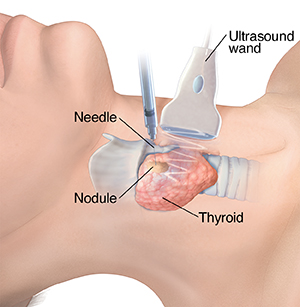Thyroid Fine Needle Aspiration (FNA) Biopsy
The thyroid is a gland at the front of the neck. A thyroid fine needle aspiration (FNA) biopsy is a procedure to take out a small piece of tissue from your thyroid gland. The tissue is taken out with a small, hollow needle. The sample is sent to a lab where it's looked at to find a diagnosis.
Why thyroid FNA biopsy is done
Hard nodules can sometimes form inside the thyroid gland. You may notice a small bump in the gland area. Thyroid nodules are common. The nodules are often not dangerous. But in some cases, they can be thyroid cancer. A thyroid FNA biopsy can test for cancer.
Risks of thyroid FNA biopsy
All procedures have some risks. The risks of thyroid FNA biopsy include:
-
Bleeding at the biopsy site
-
Infection
-
Damage to areas near the thyroid (rare)
-
Need for a repeat biopsy if the test result is in doubt
Getting ready for your procedure
Talk with your healthcare provider about how to get ready. Tell them about all the medicines you take. This includes prescription, over-the-counter medicines, such as ibuprofen, vitamins, herbs, and other supplements. You may need to stop taking some medicines before the procedure, such as nonsteroidal anti-inflammatory medicines, blood thinners, and aspirin. You should be able to eat and drink normally before the procedure.
On the day of your procedure
Your procedure may be done in a hospital or a medical clinic. You should be able to go home the same day. The procedure often goes like this:
-
You may be given a medicine to help you relax, if needed. Arrange for a ride home if you are given medicines that make you sleepy.
-
A local anesthetic (numbing medicine) may be injected in the area in the front of your neck. Because the biopsy needle is so small, this may not be needed. You will most likely be lying on your back for the procedure, with a pillow under your shoulders to extend your neck.
-
Your healthcare provider may use an ultrasound machine during the biopsy. This machine uses sound waves and a computer to show live images of the tissues in your neck. This helps your healthcare provider guide the needle to the right spot. A gel will be put on your neck. This helps the ultrasound wand maintain contact with your skin and enhances the signal made by the sound waves.
-
The biopsy area will be cleaned. A thin, fine (narrow) needle will be put through your skin and into your thyroid gland. You may feel a small amount of pain or pressure. The needle will be gently pushed into the nodule. A syringe attached to the needle will use gentle suction to take out a small piece of tissue from the nodule. This process may be done several times in the same nodule to get different samples from all parts of the nodule. You will need to be very still. You should not cough, talk, or swallow while the needle is put in.
-
The needle will then be taken out. A small bandage will be put on the needle insertion site. The tissue will be sent to a lab to be looked at for signs of cancer.
-
Sometimes the healthcare provider will use the ultrasound wand again 15 to 30 minutes later. This is to check that there is no bleeding or swelling where the biopsy was done.

After your procedure
You’ll likely be able to go home that day. You'll likely be able to go back to your normal activities right away. You can take off your bandage within a few hours.
The site of the biopsy may be sore for a day or 2 after the procedure. You can take over-the-counter pain medicine, such as acetaminophen, as needed. Follow any other instructions that your healthcare provider gives you.
Follow-up care
Ask your healthcare provider when to expect to get your results from the biopsy. It may take several days. In some cases, the biopsy result may be inconclusive. This means the lab can’t be sure if your nodule is cancer. You may need a repeat biopsy or surgery.
If your thyroid nodule is not cancer, you may not need any treatment. Your healthcare provider may want to keep track of your nodule. You may need another biopsy in the future.
If your nodule is cancer, you may need surgery or other treatment. Your healthcare provider will tell you more about what to expect and what needs to be done next.
When to call your healthcare provider
Call your healthcare provider or get medical treatment right away if you have any of these:
-
Fever of 100.4°F (38°C) or higher
-
Redness, swelling, bleeding, or fluid leaking from the biopsy site
-
Pain around the biopsy site that gets worse
Be sure you know how to reach your healthcare provider after office hours and on weekends and holidays.